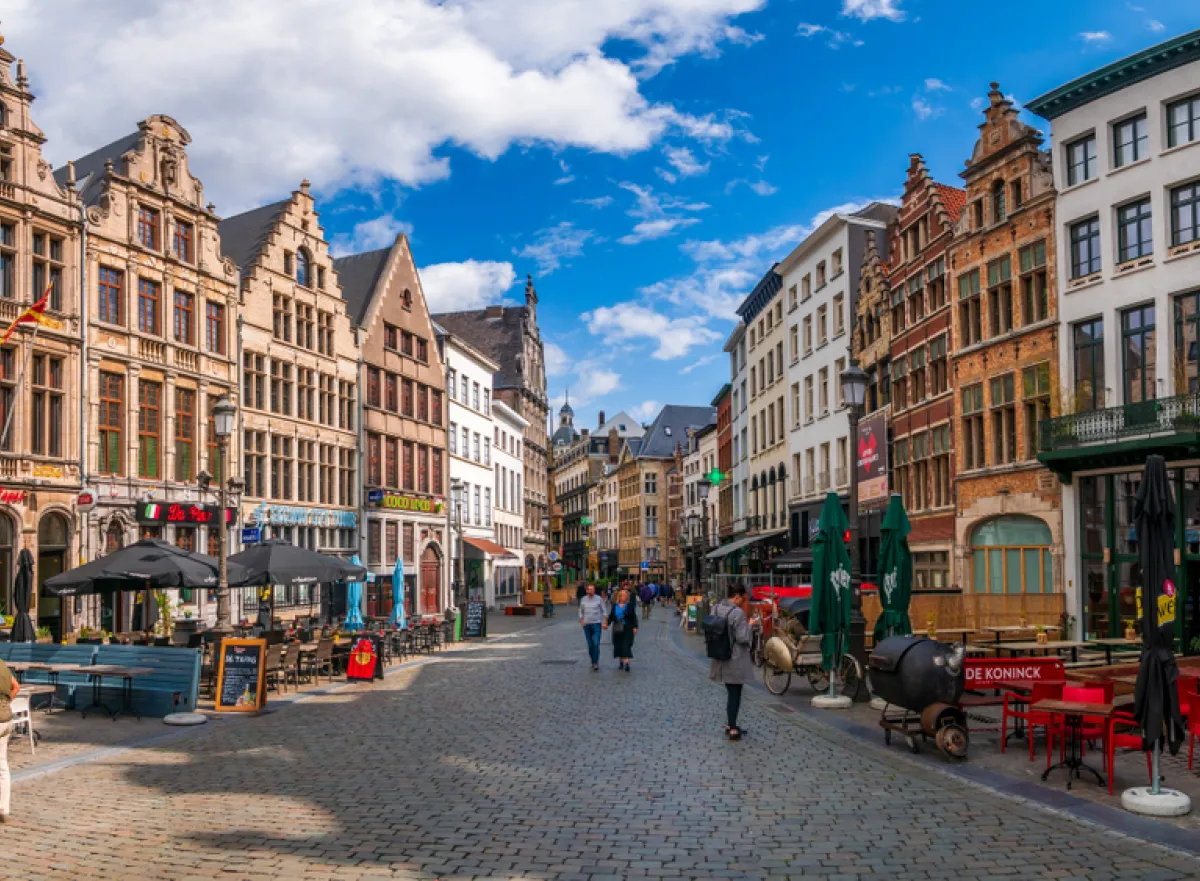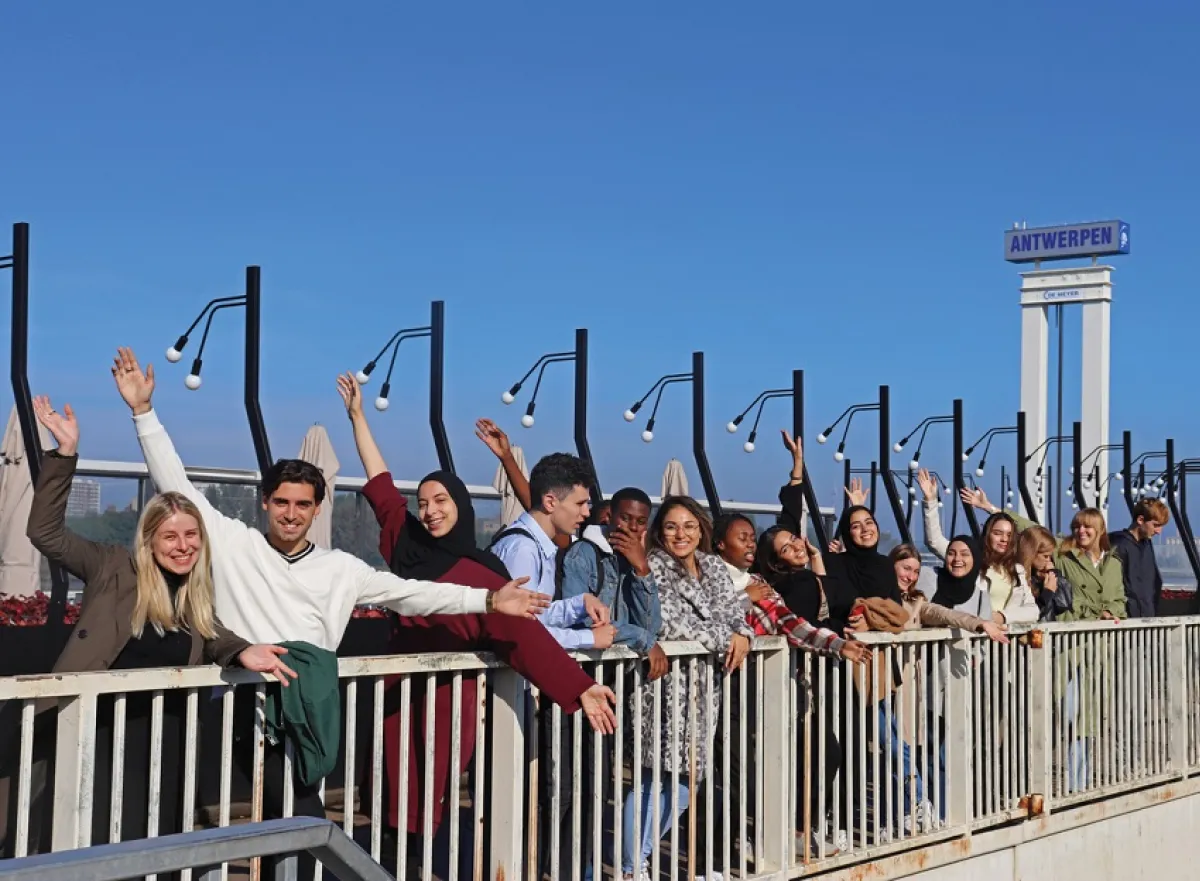Exchange programme: minor of the professional bachelor Multimedia & Communication technology
- Does your heart starts beating faster upon hearing the words human technology and creative thinking? This is your playground.
- Open to students in Multimedia Studies.
- Get inspired by our mix of technology, interaction and creative thinking
- Study in an international classroom: a great first step toward a global career.
- You will be guided through this programme by highly skilled professionals and dedicated teachers
- All courses are taught in English.
- You can join free Dutch language classes alongside your studies.
- The programme runs during the spring semester only

More questions?
Cynthia Plette
incoming.sat@kdg.be
+32 3 502 23 55
What to expect?
This programme is presented to you by the faculty of Science & Technology. This is your chance to create and design.
- Writing interesting and compelling narratives.
- You will draw on different technologies such as the Internet of Things, Artificial Intelligence and Augmented Reality to find solutions to real-life challenges.
- User experience and Interaction are key to everything you do in this semester.
Creative Technologies & Interaction offers a fine selection of courses of the professional bachelor Multimedia & Creative Technologies, a degree programme entirely in English. Therefore, classes will be attended by both international degree students and exchange students, creating a real international experience.
Courses
1.3 3D development
(
3 credits
)
During this course you learn the basic principles of 2/3D development and you can document this. Further, you will build a basic interactive real-time application for Windows platforms with a game engine.
Topics covered in this course are:
- Game Engine Basics
- Interactivity/Scripting
- Physics
- Lighting
- Audio
- Animation
- UI
- Building/Publishing
The course starts from scratch; so there are no prerequisites for this course.
1.3 Storytelling basics
(
3 credits
)
A combination of storytelling and good design should work in partnership to turn what can be a ‘dry’ publication into a truly effective communication piece. In addition to good storytelling, good design can help your story deliver an emotional punch, and make it clear what’s distinctive about your organisation’s work. This course will help you become an expert in both aspects.
During the course, you explore and explain various storytelling tools and techniques (e.g. design thinking) to improve or invent creative concepts. Further, you will generate creative concept ideas and develop creative concepts (individually and in team context).
Topics that are covered:
- The importance of storytelling in (on-line) communication.
- What is storytelling, how can it be used in organizations.
- The importance of scenario’s, structure and visualization.
- Short creative assignments will stimulate students to cooperate and create their own ideas
- Using examples and briefings from practice, the student will be challenged to create new innovative media concepts and to improve existing concepts.
2.3 Strategy & creation
(
3 credits
)
This course is about making a brand attractive, sustainable and value-driven. Building, strengthening or boosting the image of a brand to get it out of a slump and arm it with the same tools as the big players. Thinking up creative and strategic solutions to Growth Hacking. You will learn all these things in this profession. You start from a Design Thinking approach and devise solutions tailored to your customers.
You give brands a boost by making them stand out and flourish in a smart and strategic way. You learn the basic principles of Reputation Management and can apply these to existing or new brands so that they can outshine their competitors.
2.4 3D animation 2
(
3 credits
)
In this course you will get a more in-depth knowledge of the animation possibilities in your 3D software:
- You manipulate supplied 3D models in function of polygon flows, making materials, rigging and animation and bring them to life according to learned techniques in the used 3D software.
- You build and test the rigs of the supplied 3D models.
- You create an animation for a more complex 3D problem, related to rigging and physics.
2.3 3D VFX (light)
(
3 credits
)
In this course you will integrate new 3D content into recorded real-life film content. This requires not only that the 3D materials used and camera positions be adjusted and merged with the life footage into a coherent end result, but also that the overall lighting of the 3D model should match the life footage very carefully.
The final post-production (basic colour grading, special effects,...) takes care of the finishing touch.
2.4 Motion graphics
(
3 credits
)
Prepare graphics and illustrations for animation. You'll work with existing designs (logo's, maps, icons, ...) and self-made illustrations. Be basic principles of animation. You'll move the separated parts of your designs on screen.You will learn the basic principles of Motion Graphics on the basis of short individual assignments. Once you have mastered it, you can choose the techniques and methods you prefer to work with. In this way you compile a portfolio of smaller screen graphics and slightly more extensive projects over the course of time. This portfolio can look different for each student depending on your choices and focus. In this course you can also make motion graphics in consultation with the teachers to clarify projects from other (optional) courses with moving graphics.
2.4 Real-time 3D
(
4 credits
)
In this course you work on the creation of a basic real-time 3D game with a focus on:
- Game engines
- Preparation of the 3D content, with the optimization of given 3D models, by working towards low-poly models, good unwrapping and compact texturing, and making of basic animations to integrate in your game
- Creation of a user-friendly user interface
- a good game play and user experience of your game
1.3 Science, technology and society (RMPL)
(
4 credits
)
The impact of technology, especially multimedia and communication technology (MCT), is arguably the most important variable of change in life in the 21st century. With an emphasis on society, economy, media and ethics, we offer different seminars and guest lecturers and invite you to think for yourself, reflect on society, politics and the impact of technology, and do something wonderful with all the new and old ways of cultural expression that our world provides.
Topics for the seminar can include (subjects can change according to actual developments):
- Digital evolution - Past, Present and future outlook of digital technology
- Media and artificial intelligence
- A brief history of the 4th industrial revolution
- Ethical challenges posed by digital innovation
- Technologies of the future
- Virtualization of the world
- Life 3.0 - the impact of AI
- The structure of scientific revolutions
1.4 Visual communication
(
4 credits
)
In this course you will learn the basics of both photo editing and vectorial drawing:
- You develop a professional interface
- You design a vector logo
- You understand the rules of usability and know how to apply them in your project
- You are able to design characters, assets and environments for your game
- You are able to design a moodboard for a game
- You are able to design branding for your game
Dutch as a foreign language
(
3 credits
)
This course will help you to develop your skills in Dutch, the language spoken in the Netherlands and in Flanders.
The learning objective is to reach level A1 of the CEFR for languages:
- Understand and use familiar everyday basic phrases.
- Introduce yourself and others.
- Interact in a simple way provided the other person talks slowly and clearly and is prepared to help.
However, students who are fluent in German tend to learn Dutch very fast and can reach an A2 level in one semester and will have the chance to do so.
- You’ll learn about the culture of Antwerp and Belgium.
- You’ll recognize grammatical structures (A1) and use them (A2).
- You’ll develop your vocabulary, listening and speaking skills.
- You can choose between a more interactive and fun approach or a more classical approach focusing on grammar and vocabulary.
Academic guide
Download the academic guide for 2025-2026 (pdf) for more information on the current programmes.
For whom?
- All students enrolled to Multimedia Studies or a strongly related study field studying at one of our partners schools can apply.
- You have prior knowledge in programming.
If your school does not have a partnership within the study field multimedia, please ask the coordinator at your international office to contact us.
English language requirements
The entire programme is taught in English, so a good command of the language is essential. Level B2 is strongly recommended.
- If your English is not sufficient, you may struggle to complete assignments or pass exams. This is the responsibility of your home institution.
- Students who want to improve their English can take courses at Linguapolis, the language centre of the University of Antwerp. These courses are at your own expense, and applications and fees are to be arranged directly with Linguapolis.
When?
Spring Semester 2026
- Welcoming Days: 29 & 30 January
- Start classes term 3: 2 February
- Deadline changes LA: 23 February
- Half term holidays (1 week): 16-20 February
- Examinations: 23-27 March
- Start classes term 4: 30 March
- Seasonal holidays (2 weeks): 6 April – 20 April
- Examinations: 1 – 17 June
- End of semester: 19 June
- Farewell event: To be decided
Where
- You will study at our Campus Hoboken, the Faculty of Science & Technology in the south of Antwerp.
- You will have classes at the Campus Hoboken, the fablab at Campus Hoboken, our studios at campus Sint Jozef and Campus Zuid.
- The campus enjoys excellent bus and tram links, and the Antwerp South train station is just a short ride away.
Study in Antwerp, Belgium
- Home to around 50,000 students and more than 170 nationalities.
- Antwerp is a safe, diverse and welcoming international student city.
- Situated on the River Scheldt, this mini metropolis is a gateway to the world.
- A perfectly located economic hub steeped in history, and always evolving.
- Brussels, Amsterdam, Paris and London all within easy reach.
Atypical Antwerp, the movie

Practical information
Student onboarding (all the essential information you need)
Guidance and support
- You are not alone. KdG staff are here to support you with your studies.
- Students with special needs can apply for individual measures, which are set down in an 'Individual Learning Certificate' (ILC). The granting of these allows for certain concessions in your education and evaluation.
- Your mental wellbeing is important for us. More about guidance and support at KdG.
How to apply?
- Ask your home institution to communicate your nomination to our international coordinators (per study field).
- When you are accepted, you will receive an e-mail confirming your nomination and a link to our online registration and course selection.
- When your courses have been approved by KdG, you will receive the link to Mobility Online where you can complete the rest of your application.
Deadlines Spring semester
- Nomination deadline: 1 November
- Application deadline: 18 December
Got a question? Ask an exchange student!
You will receive a fair answer, given by an experienced student.
It’s very easy, via our exchange Facebook group.
Why KdG?
-
Antwerp, Belgium – everything close by
-
International classroom – mix of local and international students
-
Real life – all hands on deck during project work
-
Strong network – partnerships with benefits for everyone
-
Happy students – numbers don’t lie. Join the community!
 Karel de Grote Hogeschool
Karel de Grote Hogeschool

